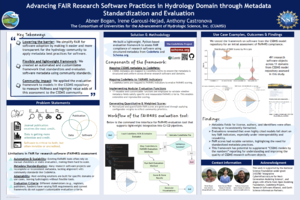2025 CSDMS meeting-101
From CSDMS
(if you haven't already)
Log in (or create account for non-CSDMS members)
Forgot username? Search or email:CSDMSweb@colorado.edu
Browse abstracts
Advancing FAIR Research Software Practices in Hydrology Domain through Metadata Standardization and Evaluation
Abner Bogan,
(He/Him),CUAHSI Syracuse New York, United States. abogan@cuahsi.org
Irene Garousi-Nejad, CUAHSI Modesto California, United States. igarousi@cuahsi.org
Anthony Castronova, CUAHSI Boston Massachusetts, United States. acastronova@cuahsi.org
While the findability, accessibility, interoperability, and reusability (FAIR) principles have been well-established for data, their application to research software (RS) remains inconsistent across disciplines. Research software is essential to advancing our understanding of Earth systems, however without agreement and consistent application of FAIR principles, sharing, reproducing, or expanding on scientific results is challenging. Aligning research software with FAIR principles enhances their impact and ensures long-term usability. Numerous frameworks exist (e.g. FAIR4RS, FAIRShare, Howfairis, FAIRSoft Evaluator) and leverage a wide range of approaches, ranging from questionnaires to semi-automated workflows. Each of these efforts has systematic gaps that hinder practical implementation, and due to the fragmentation of these efforts and lack of adoption of standards, it is challenging to combine them into a more complete solution. Our work addresses this by first evaluating these existing frameworks, identifying strengths and limitations, and developing methodologies to improve the assessment and adoption of FAIR principles in hydrology-specific research software. In doing so, we aim to address three key questions: 1) How can domain-specific knowledge shape community adoption of FAIR4RS principles? 2) What are the critical metadata components needed to enhance FAIR4RS compliance in the hydrologic sciences? 3) How can automated tools and technologies facilitate FAIR4RS assessments and provide actionable recommendations for improving FAIR4RS compliance? In this work, we establish a methodology for representing FAIR principles in community-adopted, structured, metadata representations such as Schema.Org and CodeMeta that builds on the aforementioned efforts. We evaluate our approach on community model repositories using a lightweight Python framework that quantifies the FAIR alignment of community-developed research software within the water science community. This enables automated assessment of FAIR principles and generates a quality compliance report that helps identify gaps in metadata representation. By aligning our work with ongoing efforts from the Open Modeling Foundation, community metadata standards groups, and academic research, we offer methods for aligning and evaluating the FAIRness of research software in an extensible manner that can be adopted across multiple science domains.

